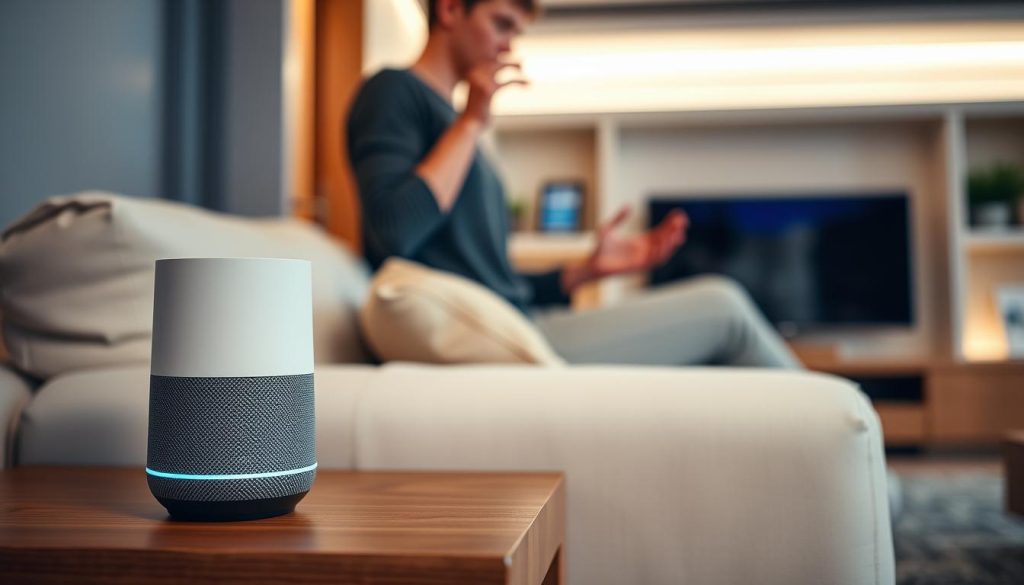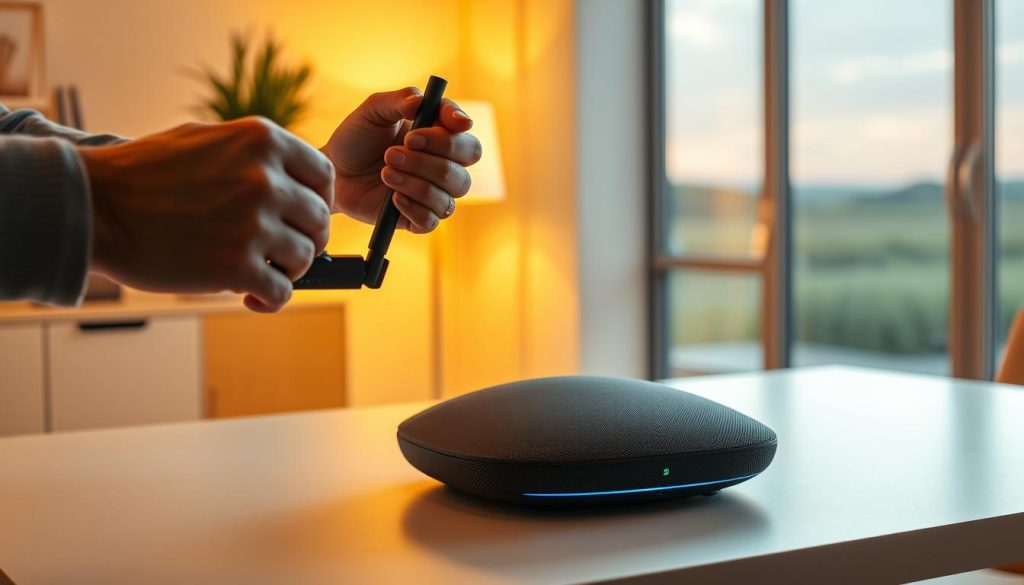When you open your holiday gifts, you might be eager to set up your new smart speaker. It could be an Amazon Echo, Google Home, or Apple HomePod. These devices are now common in homes and offices, making life easier. But, as you start using it, you might think about how cloud processing affects your personal data.
Smart speakers are convenient but raise privacy concerns. They collect and process your data in the cloud. It’s important to understand how cloud processing impacts your privacy in today’s digital world.
Key Takeaways
- Smart speakers are increasingly common in homes and offices.
- Cloud processing is a key feature of these devices.
- Concerns about privacy arise from data collection and processing.
- Understanding cloud processing is crucial for protecting your privacy.
- You can take steps to manage how your data is used by smart speakers.
Understanding Cloud Processing in Smart Speakers
When you talk to a smart speaker, your voice goes to the cloud. This is thanks to cloud computing. It’s key to how smart speakers work, letting them understand and answer your questions.
Smart speakers are devices that start when you say a special word. They record your voice and send it to the cloud. There, it’s analyzed to figure out what you want.
What is Cloud Processing?
Cloud processing means using remote servers over the internet instead of local devices. For smart speakers, it means sending your voice to these servers for analysis.
This lets them do more complex tasks than they could alone. They can recognize your voice, understand what you’re saying, and give you personalized answers.
How Smart Speakers Use Cloud Processing
Smart speakers use cloud processing to understand your voice. When you ask a question or give a command, your voice goes to the cloud. There, it’s processed and understood.
The cloud then sends back a response, which the speaker shares with you. This happens fast, making it feel natural and easy. The use of cloud computing also helps smart speakers get better over time.
The Role of Voice Data in Smart Speakers
Your voice data is key to smart speaker technology. It lets them understand and answer your commands. As you use these devices, they gather and study your voice data. This helps them get better and offer experiences tailored just for you.
Collecting Voice Data
Smart speakers gather voice data in different ways. They record your voice and interact with other devices. This data is kept in the cloud, where it’s processed and analyzed.
This process is vital for smart speakers. It lets them learn and adjust to your habits.
Analyzing Voice Data
Understanding voice data is a complex task. It uses advanced algorithms to spot patterns and preferences. This helps smart speakers give you personalized tips and get better at what they do.
For example, they can figure out your music tastes and suggest songs you might like. They also learn from how you interact with other devices. This makes them more useful over time.
Privacy Concerns with Cloud Processing
Cloud processing in smart speakers has raised big privacy worries. As you use these devices more, knowing the risks is key.
Data Security Risks
Data security risks are a big worry. Your voice data goes to the cloud, raising questions about its safety. Companies must protect this data well.
Data breaches can lead to serious problems, like your info being used without permission. It’s vital for makers to focus on keeping data safe to keep users trusting them.
Potential for Unauthorized Access
The potential for unauthorized access to your data is another big concern. If security is weak, hackers could get to your personal info.
It’s up to tech companies to keep their security up to date and follow data protection laws. As a user, knowing your device’s settings and how to manage your data is important.
By staying informed and taking steps to protect yourself, you can reduce risks from cloud processing in smart speakers. It’s a team effort between makers and users to tackle privacy worries.
How Smart Speakers Handle Your Information
The way smart home devices manage your data is key to understanding their impact on digital privacy. When you talk to your smart speaker, you share personal info. This info must be kept safe.
Let’s look at how big names like Amazon and Google handle your data. We’ll focus on how they store and share your information.
Data Storage Practices
Companies have different ways to store your voice data. For example, Amazon keeps your voice recordings forever by default. This means every time you talk to Alexa, it’s saved unless you delete it yourself.
Google, however, doesn’t save voice recordings by default. You can choose to store or delete your data through the Google Home app. This gives you more control over your data.
| Company | Default Storage | User Control |
|---|---|---|
| Amazon | Indefinite | Manual deletion through app |
| Not stored by default | Managed through Google Home app |
Data Sharing Policies
It’s important to know how your data is shared. Amazon and Google have different rules for sharing data with other services.
Amazon lets you decide what data to share with third-party skills. But, some data might still be shared to make the service better.
Google also lets you manage data sharing, mainly through the Google Home app. You can see and control what data is shared with other services.

When using voice assistant technology, knowing how your data is handled is crucial for digital privacy. By understanding data practices, you can make better choices about your smart home devices.
Benefits of Cloud Processing in Smart Speakers
Cloud processing in smart speakers brings new benefits. It allows these devices to handle lots of data fast. This means they can answer user questions more accurately.
Improved Accuracy and Performance
Cloud processing gives smart speakers access to advanced algorithms and big datasets. This boosts their ability to understand and answer voice commands well. Users get more precise and relevant responses, making their experience better.
Also, these devices learn from the data they collect. This learning makes them better at understanding language and user preferences over time.
Enhanced User Experience
Cloud processing in smart speakers also makes the user experience better. These devices can handle complex queries and access many services. This leads to more personalized and engaging interactions.
For example, cloud processing lets smart speakers work well with other smart home devices. Users can control their home environment more easily. This makes the user experience more enjoyable and streamlined.
Cloud processing in smart speakers offers more accurate and personalized answers. This makes interacting with smart home devices and getting information easier for users.
Transparency from Tech Companies
As tech companies become a big part of our lives, knowing how they handle our data is key. You have the right to understand how your data is used and kept safe.
Major tech companies like Amazon and Google work closely with advertisers and data brokers. Even though they don’t sell voice recordings, insights from your talks can shape ads. This has sparked big privacy concerns among users.

Policies by Major Brands
Big brands have set up rules to tackle privacy worries. For example, Amazon lets you check and delete your voice recordings via the Alexa app. Google does the same through Google Assistant settings. These steps help you control your data better.
But, these rules can be hard to follow. It’s vital to know the terms of the services you use. You should know how your data is gathered, stored, and shared.
Consumer Rights and Protections
You have rights over your data, like the right to see, fix, or delete it. Laws like the GDPR and CCPA aim to safeguard your rights.
- Right to access your data
- Right to correct inaccurate data
- Right to delete your data
Knowing these rights and how to use them is key to keeping your digital privacy. Being informed helps you make smarter choices about the services you use.
User Control Over Voice Data
It’s easy to manage your voice data with the settings on your smart speaker apps. You can choose to stop data collection or erase saved recordings.
Managing Voice Data Settings
Adjusting your smart speaker settings lets you control your voice data. Amazon and Google let you set up automatic deletion of recordings after a time.
- Check your smart speaker app settings often.
- Choose to delete voice recordings automatically.
- Know what data is collected and how it’s used.
Managing your voice data settings boosts your privacy and lets you control your smart speaker’s data collection.
Opting Out of Data Collection
You can stop your voice recordings from being collected. Do this by changing settings in your smart speaker app. For example, you can turn off voice recording or erase old recordings.
- Open your smart speaker app.
- Go to the settings or privacy section.
- Decide to stop voice data collection or delete recordings.
By doing these steps, you improve your data security and keep control over your voice data.
The Importance of End-to-End Encryption
As you use smart speakers, knowing about end-to-end encryption is key for your digital privacy. Voice-activated devices are more common, making your voice recordings’ security a big deal.
What is End-to-End Encryption?
End-to-end encryption keeps your messages safe. Only the sender and the receiver can see the data. For smart speakers, this means your voice recordings are safe from prying eyes. This is vital for keeping your voice data private.
Your voice data gets encrypted right before it goes to the cloud. This makes it hard for others to listen in on your voice commands.

How It Affects Your Privacy
End-to-end encryption boosts your privacy by keeping your voice recordings safe. Here’s why it matters:
- Enhanced Security: Your voice data is encrypted, keeping hackers out.
- Privacy Protection: Your voice recordings stay private, not used without your okay.
- Control Over Data: You decide who gets to see your voice data.
Smart speaker makers use end-to-end encryption to add security. This makes it tough for bad guys to get your personal info.
In short, end-to-end encryption is crucial for keeping your digital privacy safe with smart speakers. Knowing its role helps you protect your voice data better.
Future of Voice Data
The world of voice data is on the verge of a big change. This is thanks to better smart speaker tech and AI. These advancements will change how we talk to our devices and our privacy.
Trends in Smart Speaker Technology
Smart speaker tech is getting smarter fast. We’re seeing better voice recognition and more connection with other smart home devices. This makes talking to these devices easier and more natural.
Some big trends include:
- Enhanced voice recognition accuracy
- Multi-device control and integration
- Personalized experiences based on user behavior
The Role of Artificial Intelligence
Artificial Intelligence (AI) is key to improving voice data. AI is getting better at understanding voice commands. This means your smart speakers will give you more accurate and helpful answers.
Key Roles of AI:
| Function | Description | Benefit |
|---|---|---|
| Voice Recognition | AI improves the accuracy of voice command recognition. | Better user experience through fewer misinterpretations. |
| Personalization | AI analyzes user behavior to offer personalized responses. | Enhanced user experience through tailored interactions. |
| Predictive Capabilities | AI enables devices to predict user needs based on past behavior. | Increased convenience through proactive device responses. |
As AI becomes more important in voice data, we need to think about privacy. We must consider how our data is used.
Legal Regulations for Voice Data
GDPR and CCPA are key laws that guide how tech companies use voice data from smart speakers. These laws aim to protect users by setting strict rules for data use and storage.
Overview of GDPR and CCPA
The General Data Protection Regulation (GDPR) and the California Consumer Privacy Act (CCPA) are major data privacy laws. GDPR is for the European Union and sets a high data protection standard. CCPA is for California, USA, and gives users rights over their personal data.
Key Provisions of GDPR and CCPA:
| Regulation | Key Provisions |
|---|---|
| GDPR | Right to Access, Right to Erasure, Data Portability |
| CCPA | Right to Know, Right to Delete, Opt-out of Sale |
Future Implications for Tech Companies
Tech companies must follow these laws to avoid fines. They need to secure data well, be open about how they use it, and let users control their data.
As laws change, tech companies must update their data handling. This might mean regular checks, new privacy policies, and training for staff on data privacy.
By following GDPR and CCPA, tech companies can earn user trust. This helps them stay ahead in a market that values privacy.
Tips for Using Smart Speakers Safely
Smart speakers are becoming more common, making privacy and security key. It’s important to know about the risks of voice data collection and processing.
Best Practices for Voice Data Privacy
First, check your smart speaker’s privacy settings. Most devices let you control data collection. Also, update your device regularly for better security.
Learn how your voice data is used. Know how to delete your recordings if you want. Some devices let you review and delete your data, giving you control over your info.
Choosing the Right Device
When picking a smart speaker, think about the brand’s privacy stance. Look for devices that focus on data security and offer strong privacy controls. Some brands are more open about their data handling, so do your research.
The following table compares key privacy features among popular smart speaker brands:
| Brand | Data Deletion Options | End-to-End Encryption | Privacy Controls |
|---|---|---|---|
| Amazon | Yes, via the Alexa app | No | Robust controls via the app |
| Yes, via Google Home app | Yes | Detailed controls via the app | |
| Apple | Yes, via Siri settings | Yes | Limited but secure controls |
By picking a device that fits your privacy needs and following voice data management tips, you can enjoy smart speakers safely.
Consumer Awareness and Education
Smart speakers are getting smarter, and knowing how to keep your info safe is key. It’s not just about being tech-savvy. It’s about making choices that keep your privacy secure.
Importance of Understanding Tech Terms
Terms like “cloud processing” and “voice data” are not just words. They’re the heart of how smart speakers work. Understanding them helps you see how your data is used and shared. This knowledge is crucial for making smart choices online.
For example, knowing about cloud processing helps you weigh the pros and cons of using smart speakers. It’s about understanding how your voice data is processed and kept safe in the cloud.
Resources for Further Learning
There are many places to learn more about smart speakers and their impact. Tech blogs, forums, educational sites, and manufacturer resources are all great sources. They help you grow your digital literacy.
- Manufacturer websites give deep insights into how they handle your data.
- Tech blogs and news sites share the latest on smart speaker tech.
- Online forums and communities offer real advice and experiences.
By using these resources, you can make informed choices about smart speakers and other connected devices. It’s about taking charge of your digital privacy and being a smart consumer in a fast-changing world.

Learning about smart technology is a step towards protecting your privacy. As you delve into the details of smart speakers, you’ll be ready to handle the digital world.
The Ethical Considerations of Voice Data
As voice technology becomes more common, we face new ethical questions. You might use voice assistants and smart speakers often. But have you thought about the ethics behind this technology?
Using voice data raises big ethical questions. On one side, it helps your devices work better and offer a more personal experience. On the other, it means collecting and analyzing sensitive information.
Balancing Convenience and Privacy
One key issue is finding a balance between the benefits of voice tech and keeping your privacy. Manufacturers must make sure their devices are both helpful and safe.
To find this balance, consider these steps:
- Learn how your voice data is used and stored.
- Check your devices’ privacy settings to control data collection.
- Know the risks of voice data, like unauthorized access.
The Responsibility of Manufacturers
Manufacturers play a big role in protecting your voice data and being open about their methods. They need to use strong security to keep your data safe and tell you how they use it.
Here’s a look at how major smart speaker makers handle voice data security:
| Manufacturer | Data Encryption | User Control Over Data |
|---|---|---|
| Amazon | Yes | Yes, through Alexa app |
| Yes | Yes, through Google Home app | |
| Apple | Yes | Yes, through Siri settings |
By understanding the ethics of voice data and what manufacturers must do, you can make better choices. This knowledge lets you enjoy voice tech while keeping your data safe.
Conclusion: Navigating Privacy in a Smart World
Understanding how cloud processing affects your privacy is key in today’s smart world. Your voice data is very valuable. Knowing how it’s collected, stored, and used helps you keep control over your personal info.
Advancements in Smart Technology
The future of smart tech looks bright, with AI and machine learning changing how devices talk to us. But, these advances also bring up big privacy questions and risks with Voice Data.
Protecting Your Voice Data
To keep your Voice Data safe, it’s important to know how to protect it. Learn about the data storage and sharing rules of your smart devices. Also, think carefully about the permissions you give these devices. By being proactive, you can enjoy smart tech benefits while avoiding privacy risks.

